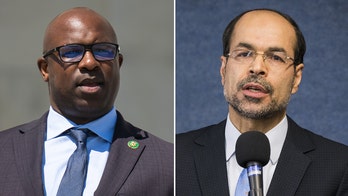The White House on Wednesday slapped new sanctions on several affiliates of Iran's Revolutionary Guard Corp. in response to Iran's defiant move to bolster its uranium enrichment program to levels capable of producing an atomic bomb.
The new sanctions target one person and four companies for penalties over their alleged involvement in producing and spreading weapons of mass destruction.
The Treasury Department announced Wednesday that it would freeze the assets in U.S. jurisdictions of Revolutionary Guard Gen. Rostam Qasemi and four subsidiaries of a construction firm that he commands and was hit with U.S. sanctions in 2007. The sanctions expand existing U.S. unilateral penalties against elements of the Guard Corps, which Western intelligence believes is spearheading Iran's nuclear and missile programs.
President Obama said he's "bent over backwards" to engage Iran in "constructive" dialogue and the U.S. will push the United Nations to sanction the country. Iran told nuclear inspectors on Wednesday that it will begin higher-grade uranium enrichment within days, Reuters reported.
"That indicates to us that despite their posturing that their nuclear power is only for, for civilian use that they in fact continue to pursue a course that would lead to weaponization," Obama said during a press conference Tuesday. "That is not acceptable to the international community.
Defense Secretary Robert Gates said the Obama White House has gone further than any administration to reach out to Iran, and called the move "disappointing." He said Tehran is violating a Nuclear Non-Proliferation Treaty and is refusing to sign off on an IAEA-brokered deal that would allow Tehran to be supplied with nuclear fuel for its medical reactor in exchange for its low-enriched uranium (LEU).
"I have never seen an administration reach out in as principled and comprehensive a way as President Obama has done," Gates said in a press conference Tuesday in Ankara, Turkey. "The response has been quite disappointing."
Iran has defied five U.N. Security Council resolutions -- and three sets of U.N. sanctions -- aimed at pressuring it to freeze enrichment, and has instead steadily expanded its program.
The country denies claims that its uranium enrichment is intended to make a nuclear warhead, saying the program is meant only for peaceful purposes. Iran, which currently enriches uranium to 3.5 percent purity, said it wants to process uranium to 20 percent so it can be used as fuel to power a research reactor in Tehran that makes medical isotopes for cancer patients.
Iranian envoy Ali Asghar Soltanieh told The Associated Press Monday that he informed the International Atomic Energy Agency of the decision to enrich at least some of its low-enriched uranium stockpile to 20 percent -- considered the threshold value for highly enriched uranium. The material in high purity form can be used in the fissile core of a nuclear bomb.
Soltanieh, who represents Iran at the Vienna-based IAEA, also said that the U.N. agency's inspectors are overseeing enrichment to low levels would be able to stay on site to fully monitor the process. And he blamed world powers for Iran's decision, asserting that it was their fault that a plan that foresaw Russian and French involvement in supplying the research reactor had failed.
"We cannot leave hospitals and patients desperately waiting for radio isotopes" being produced at the Tehran reactor and used in cancer treatment, he said.
Soltanieh declined to say how much of Iran's stockpile -- now estimated at 1.8 tons -- would be enriched.
In an interview with Fox News on Tuesday, Assistant Secretary of State P.J. Crowley called the decision a "provocative act in defiance of U.N. Security Council resolutions," saying it "does not meet the humanitarian needs of the Iranian people and it risks creating more regional instability."
Iran's intention to increase its nuclear enrichment program came just days after Ahmadinejad appeared to move close to endorsing the original deal, which foresaw Tehran exporting the bulk of its low-enriched uranium to Russia for further enrichment and then conversion for fuel rods for the research reactor.
The original plan was welcomed internationally because it would have delayed Iran's ability to make a nuclear weapons by shipping out about 70 percent of its low-enriched uranium stockpile, thereby leaving it with not enough to make a bomb. Tehran denies nuclear weapons ambitions, insisting it needs to enrich to create fuel for an envisaged nuclear reactor network.
Crowley called the IAEA-brokered proposal the "most practical and responsible solution."
"It's still on the table but they haven't said 'yes.'"
NewsCORE and the Associated Press contributed to this report.




